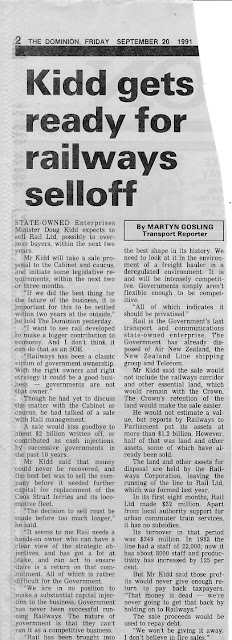Following the establishment of the NZ Railways Corporation in 1982, and many years of restructuring, the next phase for railways in New Zealand was its reform into a fully-fledged State Owned Enterprise, in the model of other such entities set up after 1985, such as NZ Post, TVNZ and (subsequently privatised) Telecom NZ, Postbank and many others. NZ Rail Ltd was formed in 1990.
The first article is reporting the loss for the first half-year of the 1989 financial year, which is put down mainly to the financing costs of the NZRC's $1.1 billion of debt, all of which had been incurred since 1982, and was in part for the capital costs of the North Island Main Trunk electrification and the costs of redundancies and restructuring of the NZRC to remain a viable business after deregulation of land transport.
The second article following on from the restructuring into NZ Rail Ltd saw the Government take over $1.3b of debt from NZRC to put it on a sounder footing. The Chair of NZ Rail Ltd and Managing Director were reported saying it "wanted" to be privatised as it was one of the most efficient freight railways in the world. It expected freight traffic to grow by 20% in the next three years. It was noted that in the following five years (through to 1996) NZ Rail Ltd would need two replacement Cook Strait ferries.
The third article notes the privatisation of Intercity for $5.1m in 1991, with 60 coaches sold with all of its routes, to a consortium of Guthreys and Ritchie's Transport Holdings. It was noted that Intercity had lost $6m in each of the 1988 and 1989 years, and only $3m in 1990, with the provisional loss in 1991 down to $2m. NZRC had already sold the Speedlink NZR Road Services freight/parcels business to NZ Post (essentially a transfer between government owned businesses). The report concluded that the Government was unwilling to inject capital to expand the Intercity business and there was no further scope to restructure. It was also noted that rivals Newmans/Mount Cook (which had recently merged) had chosen not to buy the business (and that there was likely no other buyer than Guthreys/Ritchies). The privatisation of Intercity was followed by the sale of the suburban bus business - Cityline - to the corporatised Wellington City Transport, which was subsequently privatised by Wellington City Council to Stagecoach.
The fourth article notes in 1991 then State Owned Enterprise Minister, Doug Kidd, reporting that NZ Rail Ltd would likely be sold within the next two years. He said that it would be a good business and government was not the right owner. He said it was best to sell before it needed new capital for locomotives and ferries. He claimed government could not run railways as a competitive business. It was noted as the last government transport and communications enterprise, as Air New Zealand, the NZ Line and Telecom had already been privatised. He noted that the rail corridor land would not be sold. It was noted NZ Rail Ltd made a profit of $32m in its first 8 months.
The fifth article from 1992 reports on NZ Rail Ltd's first full year financial results with a profit of $40.2m, which was a 33% improvement (annualised) on the previous year (which was a blend of NZ Rail Ltd and NZRC results). It noted that a scoping study on privatisation was being carried out. Staff were expected to be around 5297. Sales had been $496m of which 69.5% had come from rail freight, 13.3% the Interislander and 11.4% passenger services (including both long-distance and commuter services, including subsidies for commuter services). It was noted that freight rates had dropped 2.72% and NZ Rail Ltd's fuel costs were only 6% of total costs, compared to 18-20% for competitors. Freight carried was 2.47b net tonne kilometres. 15% of freight was coal, 15-20% log and timber traffic. Passenger services averaged 50-60% full, but the Tranz Alpine was achieving 70-100%. $55m of capex would be funded from profits and debt.
The sixth article from 1992 reports on NZ Rail Ltd threatening to build its own ferry terminal at Lake Grassmere as it negotiates rent with the Port of Marlborough at Picton. It noted it bought land at Lake Grassmere to preserve the option of building its own port. It noted that NZ Rail Ltd would save an hour on the ferry crossing, and trucks would save an hour of road travel time (and trains 90 minutes for travel towards Christchurch). Grassmere port was to cost between $50m and $80m at the time, with a new Wellington terminal only $12m-$15m (NZ Rail was also negotiating with Centreport).
The seventh article from 1991 further noted the earlier articles on NZ Rail Ltd wanting to be privatised, but noting the company was looking to make another 500 redundancies. Managing Director Dr Francis Small said as a private company NZ Rail Ltd could respond faster to major commercial deals.
 |
| NZRC General Manager optimistic in 1989, and NZ Rail Chair and CEO want it to be privatised 05/06/91 |
 |
| Sale of Intercity in 1991 - 17 July 1991 |
 |
| NZ Rail Ltd getting ready for privatisation 20/09/1991 |
 |
| NZ Rail first year profit of $40m 27/08/1992 |
 |
| NZ Rail may build its own ferry terminal 27/08/1992 |
 |
| NZ Rail to make 500 further redundancies 06/11/91 |
No comments:
Post a Comment
Comments are gratefully received, but comments containing abuse or spam will be deleted